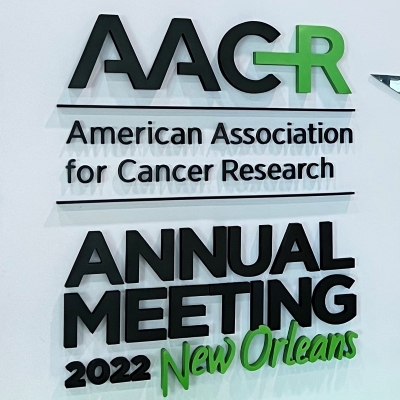April 11, 2022 -- A new study that pairs neoadjuvant nivolumab with chemotherapy for patients with nonsmall cell lung cancer (NSCLC) has the potential to revolutionize treatment, according to one expert. The research was presented April 11 at the American Association for Cancer Research (AACR) 2022 meeting and published simultaneously in the New England Journal of Medicine.
Researchers found the combination of neoadjuvant nivolumab and chemotherapy resulted in a significantly longer event-free survival and a higher percentage of patients with a pathological complete response versus chemotherapy alone.
The international randomized phase III trial was led by Dr. Patrick Forde, who presented the findings at AACR 2022 on Monday. Researchers recorded a pathological complete response in 24% of patients in the nivolumab plus chemotherapy group, compared with 2.2% in the chemotherapy-alone group.
"Results from this trial are expected to be practice-changing, as evidenced by the [U.S. Food and Drug Administration] approval of neoadjuvant nivolumab plus chemotherapy on March 4," wrote Dr. Christine Lovly, PhD, from the department of medicine at Vanderbilt-Ingram Cancer Center in Nashville in an accompanying NEJM editorial. "Overall, although challenges remain, broad implementation of neoadjuvant therapy is expected to herald a new era for lung cancer."
Despite lung cancer being a common cancer, survival among patients lags that of colon, breast, or prostate cancer, according to Lovly. The five-year survival rate remains modest because patients have both local or regional relapse and metastatic relapse.
Neoadjuvant therapy could help improve survival rates by reducing tumor burden before surgery, creating surgery with fewer complications. Additionally, it offers physicians the ability to assess therapeutic response, Lovly added.
That's where the research conducted by Forde, the director of the thoracic oncology clinical research program at Johns Hopkins in Baltimore, and colleagues, enters the picture. In their trial, they randomly assigned patients with stage IB to IIIA resectable NSCLC to receive three cycles of nivolumab plus platinum-based chemotherapy or platinum-based chemotherapy alone, followed by resection.
The primary endpoints were event-free survival and a pathological complete response. (A 0% viable tumor in resected lung and lymph nodes.) Both endpoints were evaluated by a blinded, independent review. Overall survival was an important secondary endpoint.
The research team found the median event-free survival was 31.6 months with nivolumab plus chemotherapy and 20.8 months with chemotherapy alone. The percentage of patients who had a pathological complete response was 24% in the nivolumab plus chemotherapy group versus 2.2% in the chemotherapy-alone group.
Forde and colleagues observed these benefits across all the analyzed subgroups while also finding minimally invasive surgery was more common and pneumonectomy was less common with nivolumab plus chemotherapy compared with chemotherapy alone.
Regarding adverse events, the researchers noticed grade 3 or 4 treatment-related adverse events in 33.5% of the patients in the nivolumab plus chemotherapy group and in 36.9% of patients in the chemotherapy-alone group.
Lovly predicts the ripple effects of this study will travel far and wide but cautioned that several issues must first be addressed. For instance, is a pathological complete response predictive of event-free survival? Can event-free survival be used as a surrogate endpoint for overall survival? Also, what criteria should be used to select patients to receive adjuvant therapy? In the study, patients with tumors that harbored EGFR or ALK mutations were excluded, so will biomarker testing be required at the time of diagnosis? If so, that would be a huge shift in the routine practice of lung cancer medicine.
Further, neoadjuvant therapy requires a disease-management team comprising experts in oncology, surgery, pathology, and more, which may be challenging in some centers. It's an important consideration to keep in mind so that regardless of location, all patients have access to potentially life-saving therapies, Lovly wrote.
Despite the questions, Forde and colleagues have ushered in a new era in lung cancer treatment in which innovative treatments are supported by a "strong biologic rationale with a timely assessment of antitumor responses in order to deliver on the promise of a decreased incidence of lung cancer-related death among patients with early-stage disease," Lovly concluded.
Disclosures: This study was funded by Bristol Myers Squibb.
Do you have a unique perspective on your research related to cancer treatment? Contact the editor today to learn more.
Copyright © 2022 scienceboard.net









